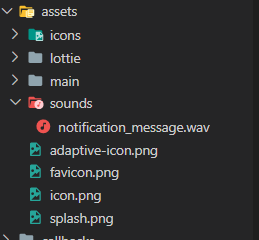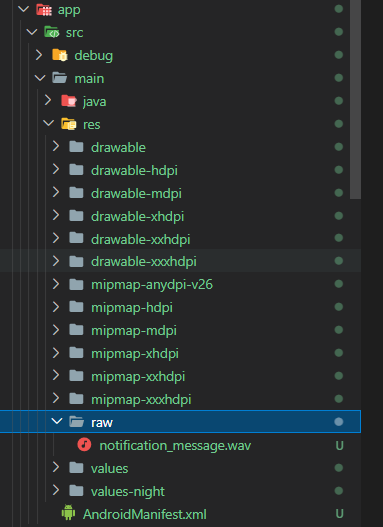expo: Custom notification sound not working
Summary
I am trying to play custom sound when receiving notification. I am using eas build. I have added a wav sound in the following location: “./assets/sounds/notification_message.wav”. I added it to app.json using the expo-notification config plugin, then created a custom-dev client using eas build -p android --profile development.
The problem is that when sending a push notification using fcm or scheduling a notification with the sound property: “notification_message.wav”, the message is received but no sound. I am testing on android 6, so there is no channelId is needed as mention in the documentation.


expo prebuild shows that it is found in res/raw

Managed or bare workflow? If you have made manual changes inside of the ios/ or android/ directories in your project, the answer is bare!
managed
What platform(s) does this occur on?
Android
Package versions
“expo-dev-client”: “~0.8.4”, “expo-notifications”: “~0.14.0”,
Environment
Expo CLI 5.2.0 environment info: System: OS: Windows 10 10.0.19042 Binaries: Node: 16.14.0 - C:\Program Files\nodejs\node.EXE npm: 8.3.1 - C:\Program Files\nodejs\npm.CMD npmPackages: expo: ^44.0.0 => 44.0.4 react: 17.0.1 => 17.0.1 react-dom: 17.0.1 => 17.0.1 react-native: 0.64.3 => 0.64.3 react-native-web: 0.17.1 => 0.17.1 Expo Workflow: managed
Reproducible demo
https://github.com/ramiel1999/custom-notification-sound
import Constants from "expo-constants";
import * as Notifications from "expo-notifications";
import React, { useState, useEffect, useRef } from "react";
import { Text, View, Button, Platform } from "react-native";
Notifications.setNotificationHandler({
handleNotification: async () => ({
shouldShowAlert: true,
shouldPlaySound: true,
shouldSetBadge: false,
}),
});
export default function App() {
useEffect(() => {
registerForPushNotificationsAsync();
}, []);
return (
<View
style={{
flex: 1,
alignItems: "center",
justifyContent: "space-around",
}}
>
<Button
title="Press to schedule a notification"
onPress={async () => {
await schedulePushNotification();
}}
/>
</View>
);
}
async function schedulePushNotification() {
await Notifications.scheduleNotificationAsync({
content: {
title: "You've got mail! 📬",
body: "Here is the notification body",
data: { data: "goes here" },
sound: "notification_message.wav",
},
trigger: { seconds: 2 },
});
}
async function registerForPushNotificationsAsync() {
let token;
if (Constants.isDevice) {
const { status: existingStatus } = await Notifications.getPermissionsAsync();
let finalStatus = existingStatus;
if (existingStatus !== "granted") {
const { status } = await Notifications.requestPermissionsAsync();
finalStatus = status;
}
if (finalStatus !== "granted") {
alert("Failed to get push token for push notification!");
return;
}
} else {
alert("Must use physical device for Push Notifications");
}
return token;
}
Stacktrace (if a crash is involved)
No response
About this issue
- Original URL
- State: closed
- Created 2 years ago
- Comments: 18 (2 by maintainers)
Well for some reason with scheduled notifications and notifications sent with fcm you need to pass the vibrate property. It doesnt make sense why the vibrate property is needed to trigger the custom sound but it is needed.
I documented it here: https://github.com/itsramiel/FCM_Push_Notifications_Guide
I encountered this issue as well. It’s only working if I include
vibrate:falseIn my case, i was using just a single Notification channel, and trying to use the sound argument when i created the local notification. This doesn’t work on newer Android versions…
You need to create new channels for each different sound:
(note that for some reason, I couldn’t use a custom notification sound on the ‘default’ channel).
And then you can use something like this, and the custom notification sound works:
In you app.json:
@sotirelisc Expo Notifications Service send their own payload to the respective platforms. You just use their API, and it doesnt support custom sounds. There is really nothing you can do except doing it yourself which the guide shows you
@itsramiel Thanks for the guide! But why doesn’t it work with Expo Notifications Service and only with FCM?